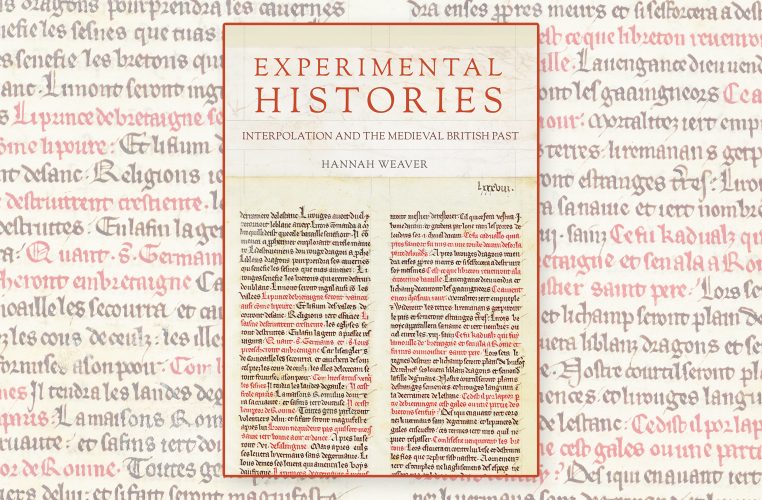Events
Registration required even by CU/BC ID holders
Cosponsors
- Office of the Divisional Deans in the Faculty of Arts and Sciences
- Department of English and Comparative Literature
- Heyman Center Fellows
Organizer
- The Society of Fellows and Heyman Center for the Humanities
Contact
email address [email protected]

Experimental Histories: Interpolation and the Medieval British Past
by Hannah Weaver
In Experimental Histories, Hannah Weaver examines the medieval practice of interpolation—inserting material from one text into another—which is often categorized as being a problematic, inauthentic phenomenon akin to forgery and pseudepigraphy. Instead, Weaver promotes interpolation as the signature form of medieval British historiography and a vehicle of historical theory, arguing that some of the most novel concepts of time in medieval historiography can be found in these altered narratives of the past.
For Weaver, historiographical interpolation constitutes the traces of active experimentation with how best to write history, particularly the history of Britain. Historians in twelfth- and thirteenth-century Britain recognized the difficulty of enfolding complex events into a linear chronology and embraced innovative textual methods of creating history. Focusing on the Brut tradition but also analyzing the long history of interpolated historiography, including the Bayeux Embroidery, Experimental Histories offers a new interpretation of generic remixing in medieval writing about the past. Drawing on both manuscript studies and the new formalism, it shows that the practice of inserting materials from romance and hagiography allowed creative revisers to explore how lived events relate to passing time. By embracing interpolation, Weaver provides lively insights into the ways that time becomes history and human actors experience time.
About the Author
Hannah Weaver is an Assistant Professor of English and Comparative Literature at Columbia University. She teaches and writes about the literature of medieval Europe, particularly the regions now known as England and France. Her first monograph, Experimental Histories: Interpolation and the Medieval British Past (Cornell, 2024), argues that interpolation is the signature form of medieval British historiography and a vehicle of historical theory. Her articles about everything from time in Sir Gawain and the Green Knight to the treachery of incomprehensible English to the relationship of genre to purgatory have appeared or are forthcoming in ELH, New Literary History, New Medieval Literatures, JMEMS, and Viator, among other venues.
About the Speakers
Manan Ahmed, Associate Professor at Columbia University, is a historian of South Asia and the littoral western Indian Ocean world from 1000-1800 CE. His areas of specialization include intellectual history in South and Southeast Asia; critical philosophy of history, and colonial and anti-colonial thought. He is interested in how modern and pre-modern historical narratives create understandings of places, communities, and intellectual genealogies for their readers. He is a member of Columbia's Center for Study of Ethnicity and Race, Center for the Study of Muslim Societies, and Committee on Global Thought. He is a Senior Editor at Comparative Studies of South Asia, Africa, and the Middle East.
Denise Cruz writes and teaches about gender and sexuality in national and transnational cultures in the Department of English and Comparative Literature at Columbia University, where she is also the chair. She uses spatial and geographic frameworks (from the transpacific, to the regional, to the Global South) to examine previously unstudied archives (from the first works of English literature by Filipina and Filipino authors, to private papers that document connections between the Midwest and U. S. empire, to fashion shows in Manila). She contends that this combined analytical and archival approach extends our understanding of the importance of national, regional, transnational, and global dynamics in North America, the Philippines, and Asia.
Andrew Galloway is the James John Professor of Medieval Studies at Cornell University. He teaches and writes about a range of time-bound, yet widely implicated features and transformations of medieval and early-modern literature and culture in England, circa 800-1600. His areas of focus include book history, ethical norms, and literary and social expressions, the interaction between Latin culture and vernacular transformations (English and French), pre-capitalist economic modes and their literary and historiographical resonances, the reception of classical literature, and the roles of women in literary, religious, and ritual contexts.
Eleanor Johnson is an Associate Professor of English and Comparative Literature at Columbia University and specializes in late medieval English prose, poetry, and drama; medieval poetics and literary philosophy; law and literature in the Middle Ages; and vernacular theology. She is the author of Practicing Literary Theory in the Middle Ages (University of Chicago Press, 2013), Staging Contemplation: Participatory Theology in Middle English Prose, Verse, and Drama (University of Chicago Press, 2018), and Waste and the Wasters: Poetry and Ecosystemic Thought in Medieval England (University of Chicago, 2023), and two collections of poetry, The Dwell (Scrambler, 2009) and Her Many Feathered Bones (Achiote, 2010).
NOTE: If you are a Columbia/Barnard affiliate with campus access, please use your Columbia/Barnard email when registering.
All external guests must have their OWN registration and email address. If you do not have a CU/ID, please email [email protected].
Please email [email protected] to request disability accommodations. Advance notice is necessary to arrange for some accessibility needs. This event will be recorded. By being present, you consent to the SOF/Heyman using such video for promotional purposes.
